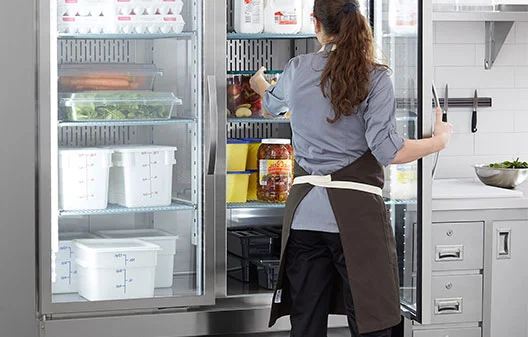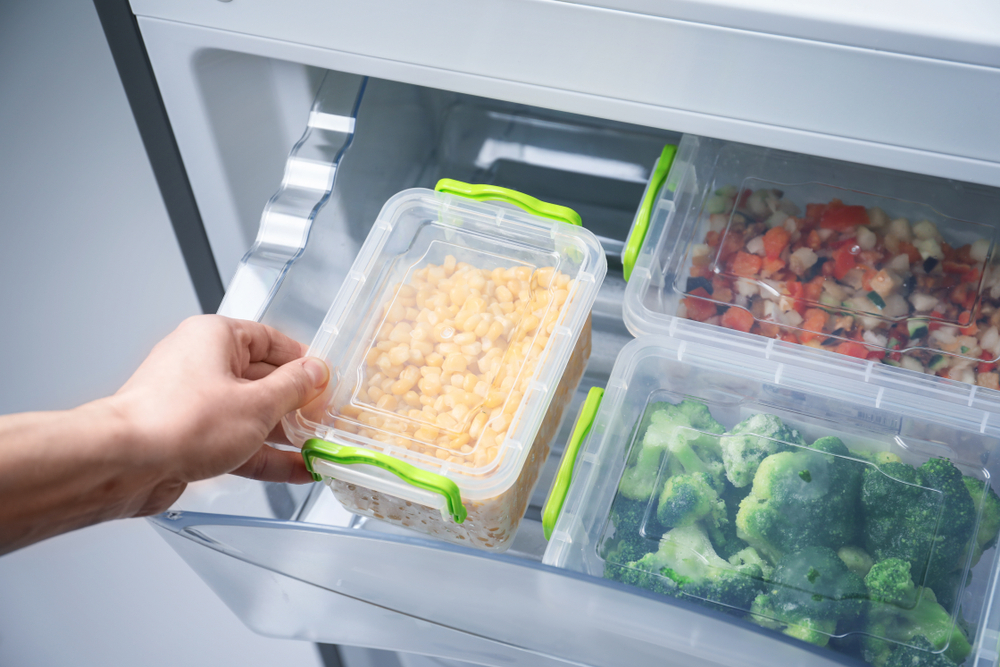When it comes to storing food, a freezer is an essential appliance that helps keep perishable items fresh for extended periods. However, the question arises: can freezer be kept outside? While the standard practice is to place freezers indoors, there are circumstances where placing a freezer outdoors might be a viable option. Factors such as climate, available space, and proper protection against the elements play a crucial role in determining whether an outdoor location is suitable for a freezer.
In this article, we will explore the considerations and guidelines to help you decide if keeping a freezer outside is a practical choice for your specific situation.
Main Problems You Might Encounter
- Climate: The climate in your area plays a significant role in determining whether a freezer can be kept outside. Extreme temperatures, such as excessive heat or freezing cold, can affect the performance and efficiency of the freezer. Consider the average temperature range throughout the year and evaluate if it falls within the recommended operating conditions for your freezer model.
- Available Space and Placement Options: Assess the available outdoor space on your property. Determine if there is a suitable location where the freezer can be placed securely. Consider factors such as proximity to electrical outlets, accessibility for maintenance, and protection from direct sunlight or rain.
- Protection Against the Elements: Adequate protection from the elements is crucial for maintaining the performance and longevity of the freezer. Evaluate if the chosen outdoor location provides shelter from rain, snow, and direct exposure to sunlight. Additionally, consider the need for a cover or enclosure to shield the freezer from dust, debris, and potential damage caused by wind or storms.
- Security Measures: Outdoor freezers may be vulnerable to theft or unauthorized access. Evaluate the security of the chosen location and consider implementing measures such as locks, surveillance cameras, or a secure enclosure to safeguard your freezer and its contents.
- Energy Efficiency and Power Supply: Assess the availability of a reliable power supply in the chosen outdoor location. Consider the distance to electrical outlets and evaluate if the freezer’s power consumption can be accommodated without overloading the circuit. Additionally, ensure that the freezer’s energy efficiency is not compromised due to exposure to extreme temperatures.
- Maintenance and Cleaning: Regular maintenance and cleaning are essential for the proper functioning of a freezer. Determine if the chosen outdoor location allows for easy access to the freezer for routine maintenance tasks such as defrosting, cleaning the coils, and checking the seals.

Maintenance and Cleaning
Regular maintenance and cleaning are crucial for keeping your outdoor refrigerator in optimal condition. Follow these guidelines to ensure its efficient operation:
- Clean the Exterior: Wipe down the exterior surfaces of the refrigerator with a mild detergent or a solution of warm water and vinegar. Remove any dirt, dust, or stains using a soft cloth or sponge. Avoid using abrasive cleaners or harsh chemicals that could damage the finish.
- Clean the Interior: Regularly remove all food items from the refrigerator and clean the interior compartments. Use a mild detergent or a solution of warm water and baking soda to wipe down the shelves, drawers, and walls. Rinse with clean water and dry thoroughly before restocking.
- Defrost Regularly: If your refrigerator has a freezer compartment, it may require periodic defrosting to remove ice buildup. Follow the manufacturer’s instructions for defrosting, which may involve turning off the unit and allowing the ice to melt naturally. Once defrosted, clean the freezer interior with a mild detergent and dry it completely before turning the refrigerator back on.
- Check and Clean the Condenser Coils: The condenser coils, located either at the back or underneath the refrigerator, collect dust and debris over time, reducing cooling efficiency. Turn off the refrigerator and gently vacuum or use a soft brush to remove the accumulated dirt. Ensure that the coils are free from obstructions for optimal airflow.
- Check the Drain Hole and Drip Tray: If your refrigerator has a drip tray or a drain hole, inspect them regularly to ensure they are clear of any blockages. Clean the drip tray with warm soapy water and ensure it is properly seated back in place.
- Maintain Proper Airflow: Keep the area around the refrigerator clear of any obstructions that could restrict airflow. Avoid placing items on top of the refrigerator or blocking the vents. Proper airflow helps the refrigerator operate efficiently and prevents overheating.
How to Ensure Your Outdoor Refrigerator Stays in Perfect Condition
- Monitor the Temperature: Keep an eye on the temperature settings of the refrigerator and adjust them according to the ambient conditions. Extreme temperatures can affect the cooling efficiency and potentially harm the stored food.
- Secure the Refrigerator: If security is a concern, take appropriate measures to prevent theft or unauthorized access. Install locks or consider placing the refrigerator in a secured enclosure to deter potential intruders.
- Regular Maintenance: Schedule routine maintenance checks by a professional technician to ensure that all components are functioning properly. This includes inspecting the condenser coils, checking the coolant levels, and addressing any issues promptly.
- Power Supply Considerations: Ensure a stable and dedicated power supply for the refrigerator. Avoid using long extension cords or overloading the electrical circuit, as this can lead to voltage fluctuations and damage the appliance.
- Monitor Food Storage: Be mindful of the food you store in the refrigerator and avoid overloading it beyond its recommended capacity. Properly organize the items to allow for efficient airflow and prevent blockages.
Potential Risks and Mitigation Strategies
1. Temperature Fluctuations: Outdoor environments may experience temperature fluctuations that can impact the performance of the refrigerator.
Mitigation strategy: Invest in a refrigerator with advanced temperature control features that can adapt to varying conditions. Additionally, consider using insulation materials or thermal blankets to stabilize the internal temperature during extreme weather conditions.
2. Exposure to Moisture: Outdoor refrigerators are exposed to moisture from rain, dew, or humidity, which can cause damage and corrosion.
Mitigation strategy: Choose a refrigerator with a durable and waterproof exterior. Ensure proper sealing of the unit and regularly inspect and replace damaged seals. Consider placing a moisture-absorbent material inside the refrigerator to minimize humidity.
3. Electrical Hazards: Outdoor electrical connections can be vulnerable to water and other environmental factors, posing a risk of electrical shock or short circuits.
Mitigation strategy: Use outdoor-rated extension cords and electrical outlets that are equipped with ground fault circuit interrupters (GFCIs) for added safety. Protect the electrical connections from exposure to water by using waterproof covers or enclosures.
4. Pest Infestation: Outdoor locations can attract pests such as insects, rodents, or birds, which may damage the refrigerator or contaminate stored food.
Mitigation strategy: Regularly inspect the area surrounding the refrigerator for signs of pest activity. Keep the surroundings clean and free from food debris. Consider using pest repellents or traps as necessary.
5. UV Radiation Damage: Prolonged exposure to direct sunlight can cause discoloration, fading, or damage to the exterior materials of the refrigerator.
Mitigation strategy: Place the refrigerator in a shaded area or use a protective cover that blocks UV radiation. If the refrigerator has a stainless steel exterior, consider using a UV-resistant coating or wax to minimize damage.
6. Increased Energy Consumption: Outdoor refrigerators may experience higher energy consumption due to ambient temperature fluctuations.
Mitigation strategy: Choose an energy-efficient refrigerator model specifically designed for outdoor use. Ensure proper insulation and sealing to minimize heat transfer. Regularly clean the condenser coils to maintain efficient cooling.
Final Words
The decision to keep a freezer outside depends on various factors such as climate, available space, protection against the elements, and maintenance requirements. By carefully evaluating these considerations and taking appropriate measures to ensure proper ventilation, protection, and maintenance, you can keep your outdoor refrigerator in good working condition.
However, it’s important to be aware of the potential risks and implement mitigation strategies accordingly. Whether you choose to keep the freezer outside or indoors, regular cleaning, temperature monitoring, and maintenance checks are essential for optimal performance and longevity.
